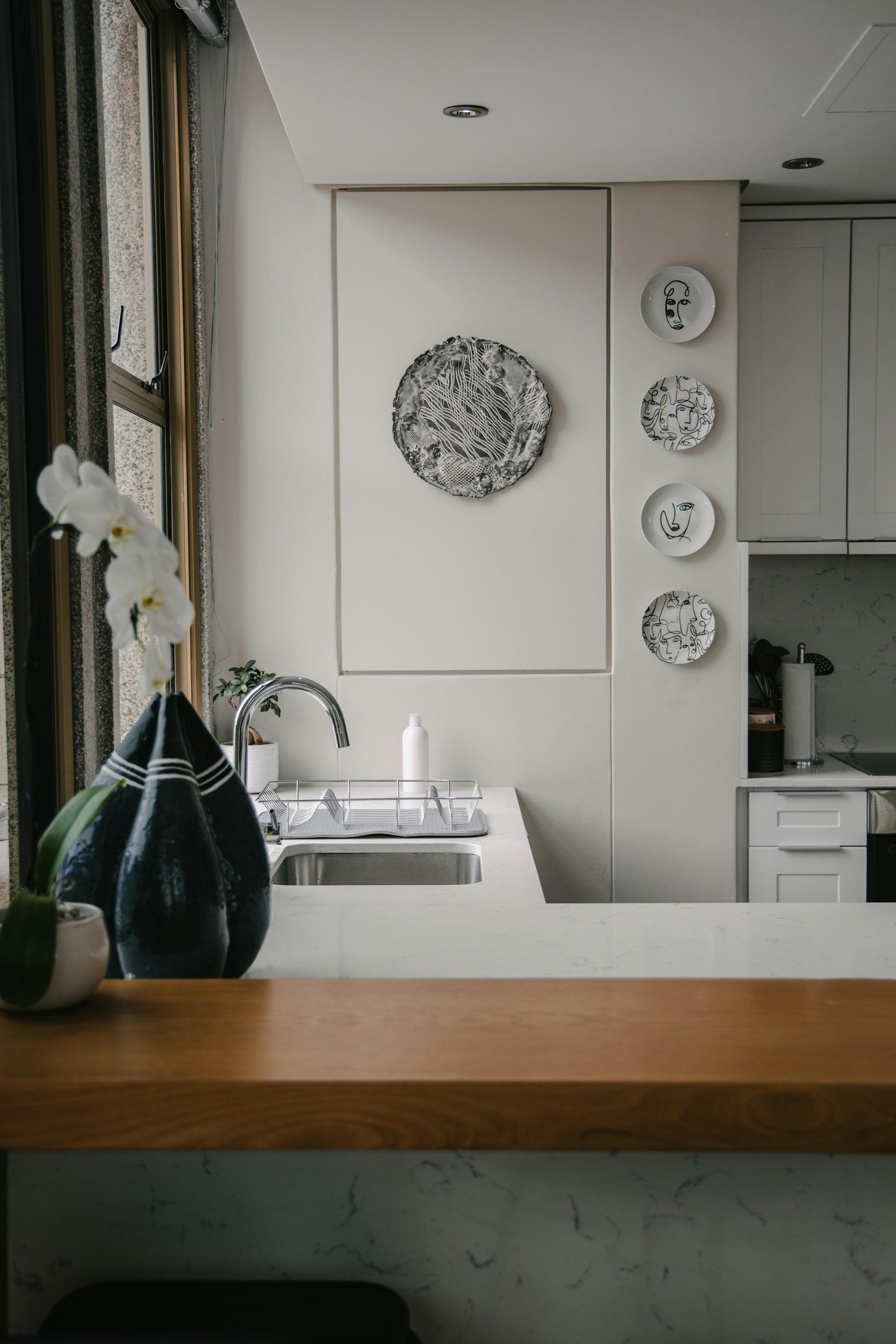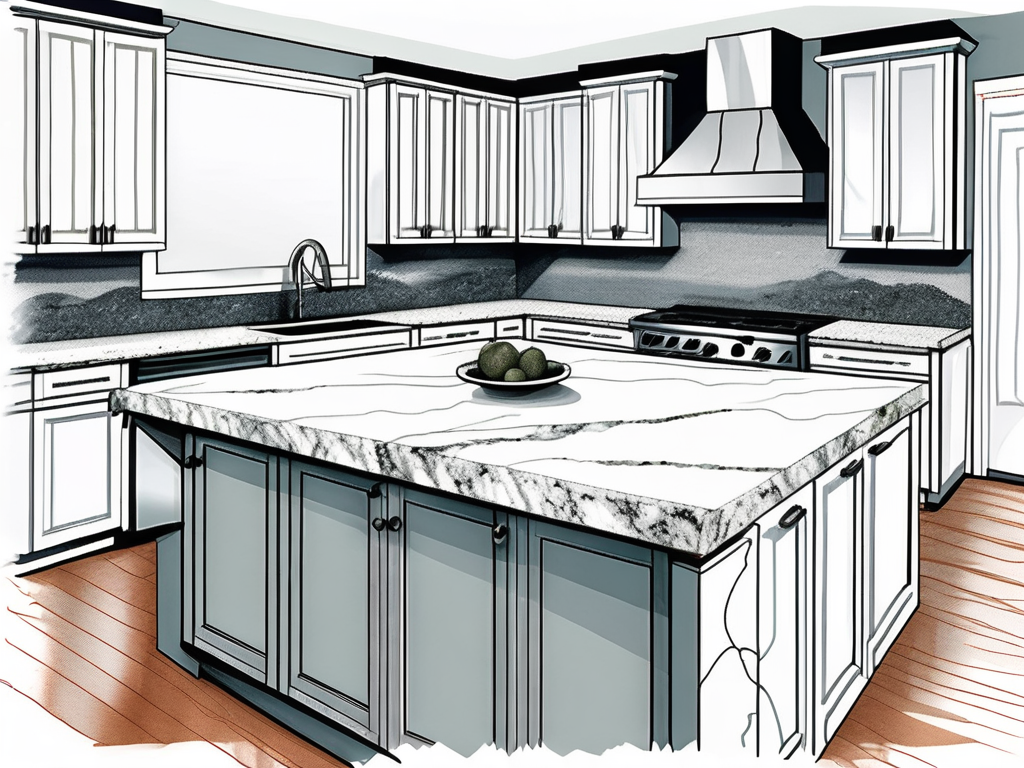Granite vs. Quartz Countertops
From nature's artistry in granite to quartz's engineered perfection, these stone titans transform kitchens into stunning, functional spaces built to withstand the test of time and taste.

Photo by Stephan Louis
Choosing the right countertop material for your kitchen or bathroom remodel can be a daunting task. With so many options available, it's important to understand the differences between each material to make an informed decision. This article will delve into the characteristics, appearance, price points, eco-friendliness, maintenance, and durability of granite and quartz countertops to help you determine which is best suited for your needs.
Understanding Different Countertop Materials
Before we dive into the specifics of granite and quartz countertops, let's take a moment to understand the unique qualities of these materials. Both granite and quartz are popular choices for homeowners due to their durability and versatility.

When it comes to choosing the perfect countertop material for your kitchen or bathroom, it's important to consider not only the aesthetic appeal but also the practicality and functionality. Granite and quartz offer a range of benefits that make them stand out from other options on the market.
Exploring the Characteristics of Granite
Granite is a natural stone that is known for its unique veining and variation in color. It is formed by the cooling of magma deep within the earth's crust, resulting in a hard and resilient material. Granite countertops are highly resistant to scratches and heat, making them an ideal choice for busy kitchens.
But what sets granite apart is its natural beauty. Each slab of granite is unique, with a wide range of colors and patterns to choose from. From the elegant and timeless black granite to the warm and inviting shades of brown and beige, there is a granite countertop that will complement your design aesthetic. The natural veining and patterns add depth and character to any space, creating a truly stunning focal point.
In addition to its beauty, granite is also known for its durability. It can withstand heavy use and is resistant to stains, making it an excellent choice for families with young children or avid cooks. With proper care and maintenance, granite countertops can last for decades, adding value to your home.

Unveiling the Properties of Quartz
Unlike granite, which is a natural stone, quartz countertops are engineered using a combination of natural quartz crystals and resins. This process creates a durable and non-porous surface that is resistant to stains, bacteria, and scratches.
Quartz countertops offer a wide variety of colors and patterns. They can mimic the look of natural stone or achieve a more uniform and consistent appearance. Whether you prefer a bold statement or a subtle elegance, quartz countertops can be customized to suit your style. The versatility of quartz allows for endless design possibilities, making it a popular choice among homeowners and designers alike.
Another advantage of quartz is its low maintenance. Unlike natural stone, quartz does not require sealing and is easy to clean with just soap and water. This makes it a practical choice for busy households where convenience is key.
When it comes to choosing between granite and quartz countertops, it ultimately comes down to personal preference and the specific needs of your space. Both materials offer unique qualities that can enhance the beauty and functionality of your kitchen or bathroom. Whether you opt for the natural elegance of granite or the sleek and modern appeal of quartz, you can't go wrong with either choice.
Comparing Appearance: Granite vs. Quartz
The appearance of your countertops plays a significant role in the overall design of your space. Here we will compare the aesthetics of granite and quartz countertops to help you determine which is better suited for your taste.
When it comes to choosing between granite and quartz countertops, it's not just about aesthetics but also about the unique characteristics each material brings to your space. Let's delve deeper into the intricacies of these two popular countertop options to help you make an informed decision.

The Aesthetics of Granite Countertops
Granite countertops have a timeless elegance that can elevate the look of any kitchen or bathroom. The natural stone patterns and veining create a unique and organic beauty that cannot be replicated by man-made materials.
Each slab of granite is a piece of art crafted by nature, with its own distinct color variations and mineral compositions. From the dramatic swirls of exotic granite to the subtle veining of classic varieties, granite offers a wide range of choices to suit different design styles and preferences.
Moreover, granite countertops not only enhance the visual appeal of your space but also add a touch of luxury and sophistication. The durability and heat-resistant properties of granite make it a practical choice for high-traffic areas like the kitchen, ensuring both style and functionality in your home.
The Beauty of Quartz Countertops
Quartz countertops offer a more consistent and uniform appearance compared to granite. The engineered nature of quartz allows for a wide range of colors and patterns to choose from, ensuring that you find the perfect fit for your design vision.
One of the standout features of quartz countertops is their non-porous surface, which makes them highly resistant to stains, scratches, and bacteria. This low-maintenance quality makes quartz an ideal choice for busy households and those who prioritize ease of care in their countertops.
Additionally, the versatility of quartz extends beyond its visual appeal. It is a sustainable choice for environmentally conscious homeowners, as quartz is an abundant material that can be responsibly sourced and manufactured. By opting for quartz countertops, you not only elevate the style of your space but also contribute to a greener future.

Price Points of Granite and Quartz Countertops
When it comes to budgeting for your countertop project, it's essential to consider the price points of granite and quartz. Let's take a closer look at what you can expect in terms of cost.
Budgeting for Granite: What to Expect
Granite countertops are available in a wide range of prices, depending on the quality, color, and rarity of the stone. On average, granite countertops cost between $50 to $200 per square foot, including installation.
Keep in mind that exotic or rare granite slabs can be significantly more expensive. Additionally, the complexity of the installation and the size of your project can influence the final price. It's important to work with a reputable supplier and installer who can provide accurate cost estimates.
Investing in Quartz: Is It Worth the Cost?
Quartz countertops tend to be more expensive than granite, with prices ranging from $60 to $200 per square foot, including installation. The cost of quartz depends on factors such as the brand, color, pattern, and thickness of the slab.
Despite the higher price tag, many homeowners find that the durability and low maintenance requirements of quartz countertops make them a worthwhile investment. Additionally, the vast selection of colors and patterns allows for greater customization and design flexibility.
Eco-Friendly Aspects of Granite and Quartz
In an increasingly environmentally-conscious world, it's essential to consider the eco-friendliness of the materials you choose. Let's explore how granite and quartz countertops stack up in terms of sustainability.
Granite: A Sustainable Countertop Option
Granite is a natural stone that is extracted from quarries around the world. While mining does have an environmental impact, many granite suppliers prioritize sustainable practices. Some companies focus on reclaiming and repurposing granite waste, reducing the carbon footprint of the industry.
Furthermore, granite is an incredibly durable material that can last for decades. This longevity reduces the need for replacements and contributes to a more sustainable approach to countertop installation.
Quartz: Environmentally-Conscious Choice
Quartz countertops are an eco-friendly alternative to natural stone surfaces. The manufacturing process of quartz utilizes recycled materials, reducing waste and promoting sustainability.
In addition, quartz countertops are non-porous, making them resistant to staining and bacterial growth. This characteristic eliminates the need for harsh chemicals and reduces water consumption often associated with regular maintenance, further enhancing their eco-friendliness.
Maintaining Granite and Quartz Countertops
Maintaining the beauty and functionality of your countertops is essential for their longevity. Here, we will discuss the proper care and maintenance required for both granite and quartz countertops.

Caring for Your Granite Countertop
Granite countertops are relatively easy to maintain. Daily cleaning with warm water and a mild detergent is usually sufficient to keep them looking their best. It's important to avoid abrasive cleaners or scrub brushes that can scratch the surface.
Periodically, you may need to seal your granite countertop to protect it from stains and water damage. The frequency of sealing depends on the porosity of the stone and your usage patterns. Consult with your countertop provider to determine the best sealing schedule for your granite countertops.
Tips for Keeping Your Quartz Countertop Pristine
Quartz countertops are known for their low maintenance requirements. The non-porous nature of quartz makes it resistant to staining and bacterial growth, eliminating the need for sealing.
For daily cleaning, warm water and mild soap are sufficient to keep your quartz countertops looking pristine. It's essential to avoid using abrasive cleaners or scrub brushes that can dull or scratch the surface. In case of stubborn stains, a gentle cleaner specifically formulated for quartz can be used.
The Battle of Durability: Granite vs. Quartz
When it comes to durability, both granite and quartz countertops offer excellent performance. Let's examine how each material holds up to the demands of everyday use.

How Durable is Granite for Countertops?
Granite countertops are renowned for their durability and heat resistance. They can withstand high temperatures without warping or cracking, making them a popular choice for cooking enthusiasts. However, it's important to note that excessive heat can still cause damage to the sealant, so precautions such as trivets or hot pads are recommended.
While granite is highly resistant to scratches and chips, it is not entirely immune to damage. It's important to avoid dropping heavy objects onto the surface and using cutting boards when preparing food to minimize the risk of accidental damage.
It's worthwhile to periodically inspect your granite countertops for any signs of damage or wear. Maintaining your countertops properly and addressing any issues early on will ensure their long-lasting beauty and functionality.
Quick facts
What is a better countertop, quartz or granite?
Quartz is better for low maintenance and consistency, while granite offers natural beauty and unique patterns. The choice depends on your style and care preferences.
What is the downside of quartz countertops?
Quartz countertops can discolor under direct sunlight, are less heat-resistant than granite, and may be more expensive than other materials.
Can you put a hot pan on quartz?
It's not recommended to place hot pans directly on quartz countertops as it may cause discoloration or cracking due to the resin content.
What is the downside to granite countertops?
Granite countertops require regular sealing to prevent staining and can crack under heavy impact. They are also less consistent in appearance compared to quartz.
Which is prettier granite or quartz?
Beauty is subjective; granite offers unique, natural patterns, while quartz provides uniformity and customizable colors to suit modern designs.
Is granite still popular in 2025?
Yes, granite remains popular in 2025 for its durability and natural appeal, though quartz has gained traction due to its low maintenance and variety.

Mihai Crisan
Software Engineer at Spoken
Mihai is a dedicated software engineer at Spoken, where he combines his passion for technology with his professional expertise. As a tech geek, he is always on the lookout for innovative solutions to simplify and enhance people's lives through cutting-edge technology. Mihai’s curiosity drives him to explore and implement new ideas that make a real impact.
Read more

